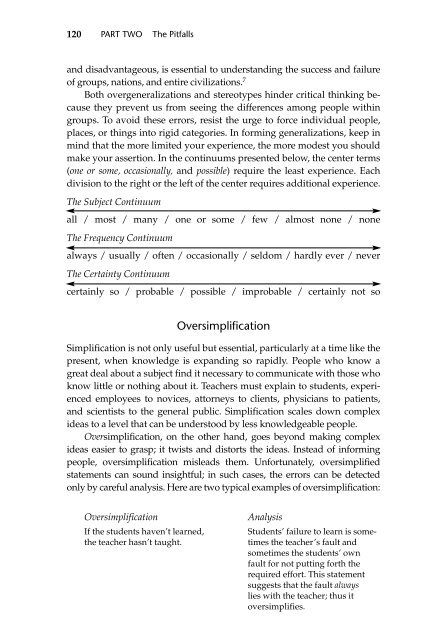Beyond Feelings
Beyond Feelings
Beyond Feelings
Create successful ePaper yourself
Turn your PDF publications into a flip-book with our unique Google optimized e-Paper software.
120 PART TWO The Pitfalls<br />
and disadvantageous, is essential to understanding the success and failure<br />
of groups, nations, and entire civilizations. 7<br />
Both overgeneralizations and stereotypes hinder critical thinking because<br />
they prevent us from seeing the differences among people within<br />
groups. To avoid these errors, resist the urge to force individual people,<br />
places, or things into rigid categories. In forming generalizations, keep in<br />
mind that the more limited your experience, the more modest you should<br />
make your assertion. In the continuums presented below, the center terms<br />
(one or some, occasionally, and possible) require the least experience. Each<br />
division to the right or the left of the center requires additional experience.<br />
The Subject Continuum<br />
all / most / many / one or some / few / almost none / none<br />
The Frequency Continuum<br />
always / usually / often / occasionally / seldom / hardly ever / never<br />
The Certainty Continuum<br />
certainly so / probable / possible / improbable / certainly not so<br />
Oversimplification<br />
Simplification is not only useful but essential, particularly at a time like the<br />
present, when knowledge is expanding so rapidly. People who know a<br />
great deal about a subject find it necessary to communicate with those who<br />
know little or nothing about it. Teachers must explain to students, experienced<br />
employees to novices, attorneys to clients, physicians to patients,<br />
and scientists to the general public. Simplification scales down complex<br />
ideas to a level that can be understood by less knowledgeable people.<br />
Oversimplification, on the other hand, goes beyond making complex<br />
ideas easier to grasp; it twists and distorts the ideas. Instead of informing<br />
people, oversimplification misleads them. Unfortunately, oversimplified<br />
statements can sound insightful; in such cases, the errors can be detected<br />
only by careful analysis. Here are two typical examples of oversimplification:<br />
Oversimplification<br />
If the students haven’t learned,<br />
the teacher hasn’t taught.<br />
Analysis<br />
Students’ failure to learn is sometimes<br />
the teacher’s fault and<br />
sometimes the students’ own<br />
fault for not putting forth the<br />
required effort. This statement<br />
suggests that the fault always<br />
lies with the teacher; thus it<br />
oversimplifies.


